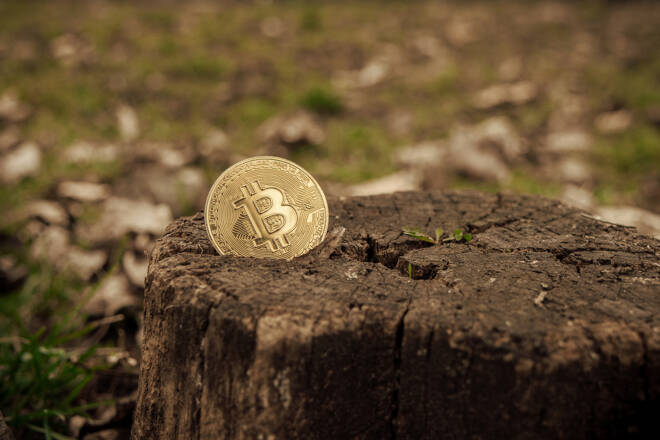Advertisement
Advertisement
Flowcarbon Raises $70m with VC Shop a16z the Lead Investor
By:
Carbon credit is a growing space in the crypto world, with blockchain firms looking to make carbon credit trading more accessible to corporations globally.
Key Insights:
- Crypto carbon credit platform Flowcarbon raised $70 million, with crypto venture shop a16z taking the lead.
- Flowcarbon raised the remaining funds in a token sale of Goddess Nature Token (GNT).
- Flowcarbon plans to put carbon trading on the crypto map and carbon credits on the blockchain.
Thanks to Proof-of-Work and bitcoin (BTC) mining, in particular, the crypto market has long been associated with environmental degradation.
In July 2021, China imposed a ban on bitcoin mining to support China’s goal of becoming carbon neutral by 2060. Before the ban, China was the largest bitcoin mining nation, with a hashrate hitting more than 75% at its peak, according to figures from Cambridge University. (75.53% in Sept-19). By contrast, the US had a hashrate of just 4.06% in Sept-19.
Since the ban, however, China has seen its hashrate climb from a Jul-21 0% to 21.1% in Jan-22. The US hashrate stood at 37.84% in Jan-22, making it the largest bitcoin mining nation.
US lawmakers have been unenamoured by its position as the world’s largest bitcoin mining nation. President Joe Biden and the US have a goal of reaching carbon zero emissions by 2050.
The continued use of fossil fuels to provide mining power has led to calls to ban bitcoin and Proof-of-Work mining altogether.
From a global perspective, the increased focus on crypto mining reflects a sense of urgency at the government level and below for more action to save the planet. This increases the need for a transparent carbon credit market.
Flowcarbon Draws Investor Interest with New Carbon Credit Platform
Flowcarbon is an open-source protocol, initially launched on Celo, aiming to bring carbon credits on-chain.
By tokenizing carbon credits, Flowcarbon provides a platform for project developers and carbon buyers to interact directly, resulting in a liquid carbon market with efficient pricing.
The goals to help achieve the Flowcarbon mission include,
- Creating a more transparent, accessible carbon market.
- Promoting sustainable practices.
- Help organizations become net zero or net negative.
Key climate goals include:
- Incentivize DAOs and other organizations to use on-chain carbon assets to become net zero or net negative.
- Lead by example to show DAOs how to become net negative carbon contributors by burning a portion of all fee revenue as carbon tokens.
Investor interest has been impressive, with Flowcarbon raising $70 million in its first round of funding.
Among first-round investors was a16z. Announcing its investment in Flowcarbon on Tuesday, a16z said,
“The carbon neutral market could potentially grow to $50B by 2030, and on-chain carbon credits can help facilitate this reality. Bringing carbon credits on-chain adds major efficiencies to the market, enabling individuals and corporations to internalize the cost of emissions, reducing negative externalities that are currently socialized, and ultimately incentivizing more sustainable practices.”
The announcement went on to say.
“Unlike current voluntary carbon credit marketplaces, which are fractured, opaque, and gated, tokenized carbon credits allow anyone the ability to purchase credits and control when they are retired as offsets, with built in liquidity and price discovery.”
With crypto mining receiving government scorn, the launch of Flowcarbon hits home the benefits of blockchain technology and the need for governments to drive innovation.
Crypto Movement Goes Green with Carbon Credit Tokens
In April, FX Empire reported that Algorand (ALGO) is to launch its first carbon emission offsetting smart contract.
As a leader in the sustainability space, the new smart contract allocates a portion of every transaction fee to offset carbon emissions. ALGO is the first pure proof-of-stake blockchain and aims to minimally impact the environment.
Also environmentally friendly is Solana (SOL). In December, Solana achieved ‘carbon neutral’ for the calendar year 2021.
OCBC Bank is also targeting the carbon credit space. In April, the Singapore bank announced plans to launch tokenized carbon credit tokens before 2023.
Metaverse Green Exchange (MVGX) and OCBC will join forces to provide green financing solutions for companies in hard-to-abate industries, including steel, cement, and chemical production.
With other firms also targeting the tokenized carbon credit space, Flowcarbon could set the pace with names like a16z behind them.
About the Author
Bob Masonauthor
With over 28 years of experience in the financial industry, Bob has worked with various global rating agencies and multinational banks. Currently he is covering currencies, commodities, alternative asset classes and global equities, focusing mostly on European and Asian markets.
Advertisement
